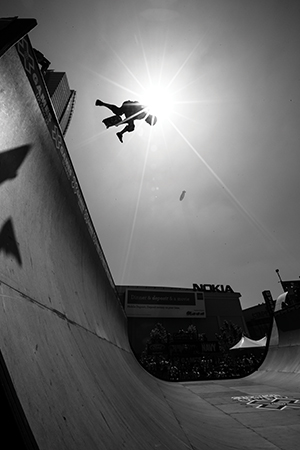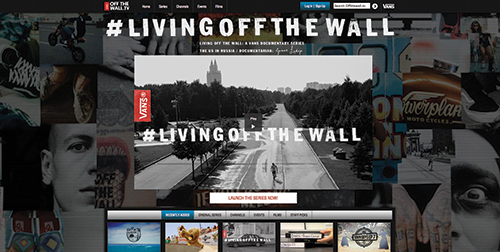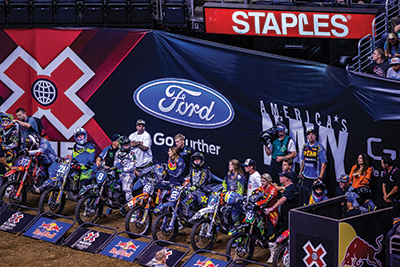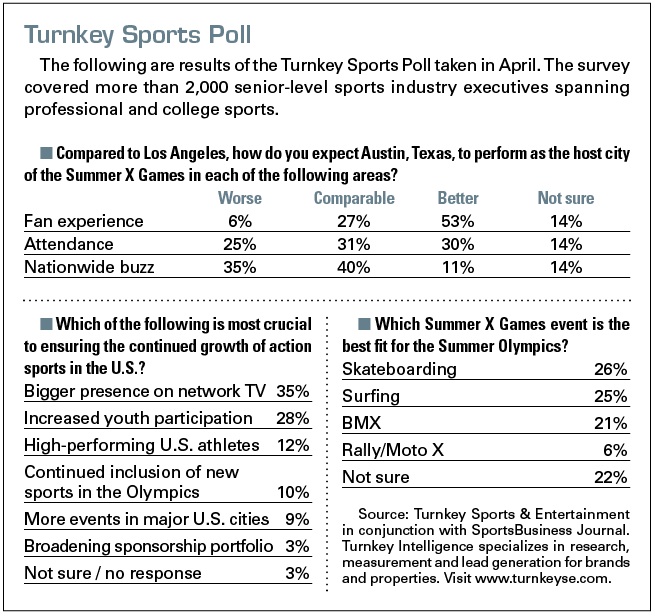When Pantech announced last year that the company planned to end its title sponsorship of the Dew Tour’s event in Ocean City, Md., the tour quickly moved to find a replacement. It pitched sports apparel companies, gaming and console developers and quick-service restaurants.
But nearly two years later, the tour still hasn’t found a title sponsor for the event. The struggle underscores the challenge action sports properties have faced in the sponsorship sales market in recent years.
Before the recession, the marquee action sports properties of the X Games, Dew Tour and Association of Surfing Professionals had more than 60 sponsors collectively. But by last year, that total had dropped by 40 percent to 37 total sponsors.
 |
The trick for action sports properties is to get sponsors to sign on the dotted line.
Photo by: Peter Morning / ESPN |
“If you talk to a sales guy who sells sponsorships in action sports, he’s having a hard time,” said Issa Sawabini, a partner at Fuse, a marketing agency that works with Mountain Dew, Harley-Davidson and other brands in action sports. “How should the [property] business model evolve is something to think about.”
The challenge with sponsorship sales is part of the reason the Dew Tour in 2012 decreased the number of sponsorships it sells from 12 to eight, and it contributed to ESPN’s $35 million loss on the Global X Games last year. It also forced ASA, an action sports event organizer, to shutter its global tour after losing sponsor LG Electronics, and it played a role in the Maloof Money Cup, a skateboarding competition, not hosting an event in 2013.
Though action sports remain a vibrant marketing platform for hundreds of brands, properties have found sponsorship sales tough. New partners like Kellogg’s and Gillette tapped into action sports to promote their brands last year, but they didn’t sponsor top action sports properties to do it. Instead, they signed athletes and developed branded content.
The reasons for properties’ sales struggles vary from event to event, but there are some common issues that all of them have run into in recent years. They include the proliferation of branded content and events, declining ratings, and changes in the way young people consume media.
“We’ve often lost [brands] because of a lack of structure,” said Steve Astephen, who heads Wasserman Media
Group’s Olympics and action sports division. “We’re fragmented and we’ve become more fragmented over the years.”
Action sports organizers are wrestling with how to reverse that trend and are focused on beefing up the assets in sponsorships and creating more customized packages that include branded content. They remain optimistic that sponsorship sales will improve.
“There’s still a great marketplace out there for action sports, but the money has gotten smarter,” said Rob Simmelkjaer, NBC Sports senior vice president who oversees the Dew Tour. “Companies are looking for clear return on investment. They want more than just [TV advertisements] and signage. Brands are looking for a high level of engagement.”
The challenges
The biggest reason action sports properties have struggled with sponsorship sales over the last five years is the rise of digital content, and no brand highlights that shift more than Vans.
The company began sponsoring the Dew Tour in 2005, and the mix of advertising on NBC and exposure to 250,000-plus spectators at five events helped double the company’s revenue. But in 2009, Vans general manager Doug Palladini decided to drop the sponsorship and shift the $3 million-plus that the company spent on the Dew Tour to create a branded content site called Off the Wall TV.
Vans began making its own videos focused on art, music, street culture and action sports. The effort drove traffic to
 |
| Some sponsors such as Vans have dropped deals in exchange for creating their own content. |
Vans.com and increased the company’s social media following so effectively that Palladini said it more than validated Vans’ decision to end its sponsorship of the Dew Tour.
“We needed those third parties [like ESPN, Fox and NBC] to connect us to an audience before,” Palladini said. “Now we can control our own destiny, and we’ve been having growing success.”
Vans isn’t the only brand to shift marketing dollars to developing digital content around action sports athletes and culture. Red Bull pioneered the concept with Red Bull Media House, and GoPro has followed suit, creating its own platform for content filmed with its cameras. Even nonendemic brands like Ford, which created a TV show around drivers including Ken Block and Brian Deegan, have followed suit.
“Savvy sports marketing brands want to create,” Sawabini said. “I sit in so many meetings where brands don’t want to sponsor something. They want to create something.”
Brands increasingly prioritize creating their own content or events, as Red Bull has been doing since 1998, rather than sign sponsorships with existing events, and that has challenged the marquee action sports properties.
“[Action sports] was a one-trick pony for a long time,” said Sean Eggert, Red Bull’s head of sports marketing. “It’s been event sponsorship. Now what you’re seeing is that it’s much more than that. Other brands are starting to realize they can control the look and feel [of an event] and what it stands for and the messaging, and that makes a lot of sense. Brands win when they can diversify and create meaningful touch points with consumers.”
The move by brands to create their own content or events has coincided with a decline in TV ratings for the two biggest media properties in action sports. X Games has seen average viewership decline for Winter X on ABC by 26 percent, from 1.4 million viewers in 2009 to 1.03 million viewers last year. Summer X saw average viewership decline 51 percent on ABC and ESPN over the same period from 1.36 million viewers to 658,000.
The Dew Tour saw similar declines. It saw a 41 percent decrease in average viewership on NBC between 2008, when it averaged 1.1 million viewers over 10 telecasts, and last year, when it averaged 654,000 viewers over six telecasts.
Before those declines, the Dew Tour and X Games had an easier time netting seven-figure sponsorships based on the media value. Now, that sale has become more difficult.
“You can’t watch TV ratings and say it’s healthy,” said Mike Jaquet, the U.S. Ski and Snowboard Association’s chief marketer and a former ad sales executive at CBS Sports. “It doesn’t fit into [big agencies’] CPM conversation.”
There’s also the perception that more and more of the young demographic that action sports claim to deliver is pulling up content online rather than watching TV.
“Media used to be important, and now that’s not where the kids are consuming,” said Bob Walker, head of Connexions Sports & Entertainment, the agency that represents Deegan. “That core demographic, the 18- to 23-year-old and 18- to 34-year-old, are consuming on phones and iPads.”
The answers
The X Games, Dew Tour and ASP have adjusted their businesses and enhanced their sponsorship offerings in response to the challenges they have faced.
ESPN recently launched a 10-month, weekly programming block on ABC called the “World of X Games” and is offering media inventory during that block in sponsorship packages for Summer and Winter X Games. It also relocated its summer event from Los Angeles to Austin, Texas, a move that will allow it to reach a new region and new fans for the first time in 10 years.
 |
Properties such as the X Games have become more flexible with the deals they offer.
Photo by: Eddie Perlas / ESPN |
Since making those changes, ESPN has signed new sponsorships with Harley-Davidson.
NBC Sports has made adjustments around the Dew Tour, as well. It brought its sales team in-house for the first time last year, which NBC credited with helping it net three new sponsors for this year’s Dew Tour — Jack Link’s Beef Jerky, Wheaties and Quiznos.
The ASP consolidated its media rights for all of its events this year for the first time and partnered with YouTube and ESPN for broadcasts of 26 major competitions. It managed to sell its first title sponsorship to Samsung for this year’s event.
“There’s a lot of interest [from brands] and there’s a lot of potential for sponsorship,” Sawabini said. “It’s just a matter of matching the needs of the sponsor with flexibility from the property.”
But more can be done to improve. Action sports marketers say that properties need to do more to sweeten their sponsorship offerings and deliver the type of customized content brands increasingly want.
“They need to work with athletes and agencies to do creative and branded content,” Astephen said. “Verizon can go to the NFL, get the league, get the players and everything. With us, you have to say: What athletes do I get? What do I do on-site?”
Astephen’s comment could be seen as self-serving, considering he represents skaters and snowboarders, but it’s supported by the success USSA had with sponsorship sales last year.
The U.S. Freeskiing team signed eight sponsors ahead of the Sochi Games, in part because it could package personal-service agreements into deals. For example, a deal it did with Chobani included an endorsement of halfpipe skier Aaron Blunck.
The Dew Tour and X Games can’t do that because they’re invitation-only events, not teams that have contractual relationships with athletes like USSA.
“We’re on terms with the athletes, and it’s easier for the athletes and agents to work with us,” Jaquet said. “I don’t see anyone else packaging event assets, intellectual property and athletes like we do and traditional ball and stick sports do, and it’s been successful for us.”
There’s also an argument to be made that the X Games and Dew Tour haven’t corrected their pricing since the recession. Their sponsorships typically top seven figures, which makes them comparable to some stick-and-ball sports. By contrast, Street League, a skateboarding competition started by Rob Dyrdek in 2010, charges in the low to mid-six figures for its sponsorships and sold out of inventory this year.
“The pricing of being an X Games sponsor or Dew Tour sponsor is not bad, but it’s meant they’re in a more competitive marketplace,” said John Cimperman, whose agency, Cynergy, worked with Dew Tour sponsor Oxy in 2008.
The X Games and Dew Tour are trying to address those issues by enhancing their sponsorship packages and being more flexible with what they offer. In the case of NBC Sports and the Dew Tour, that means being willing to act more as an agency than just a property selling sponsorships.
“We can sit down with brands and say, ‘We have a bunch of properties you can associate with, or if none of those suit you, what would you want to [create to] be your own version of that?’” Simmelkjaer said. “That’s where the real future is. Properties like X and Dew can thrive, but where brands feel ownership is where the real momentum is.”








